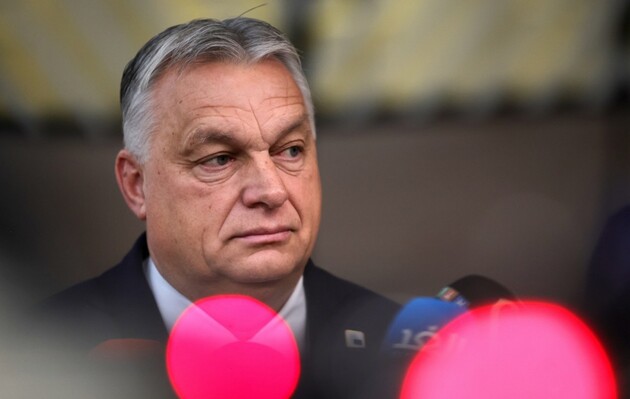The Window Is Still Open: Will Ukraine Be Able to Improve Relations with Orban?

Today marks the expiration of the 10-day term during which Kyiv was supposed to prepare proposals regarding the rights of the Hungarian minority in Ukraine. That was the agreement struck last week between the heads of the Office of the President of Ukraine and the Ministry of Foreign Affairs, Andrii Yermak and Dmytro Kuleba, with Hungarian Foreign Minister Peter Szijjártó in Uzhhorod.
The Ukrainian and Hungarian sides portray this step as their readiness for dialogue on problems in bilateral relations.
But is Hungarian Prime Minister Viktor Orbán ready to improve relations between Budapest and Kyiv?
Make no mistake: Kyiv and Budapest are far from stabilizing their relations, despite it being in the best interest of Ukraine.
Although Budapest depends on the Druzhba pipeline, which carries Russian oil to Hungary, in times of war our dependence on the neighbor is greater. Firstly, diesel is supplied from Hungary through the product pipeline in reverse mode to Ukraine. Secondly, Hungary supplies us with electricity. Thirdly, in the European Union (as in NATO) decisions are made unanimously and Budapest has the ability not only to slow down the adoption of sanctions against Russia and the allocation of assistance to Kyiv, but also to block the process of Ukraine’s EU accession.
Only Orbán has his own plans: in relations with Kyiv, Brussels and Washington, he is playing out a a chess combination, aimed at strengthening his political positions in Hungary and Europe, whilst also receiving money from EU funds frozen due to problems with the rule of law in Hungary. At the same time, Orbán, who insists on the need for a “ceasefire,” is not squeamish about having personal meetings with Putin and shaking his hand. It is not surprising that Hungary has a reputation of a Trojan horse in the European Union, destroying European unity in Putin’s interests.
Orbán’s refusal to veto the allocation of the EU’s macro-financial assistance to Ukraine in the amount of €50 billion is not so much “the result of the work of Zelenskyy, Kuleba and Yermak” (as the Telegram channel associated with the Presidental Office wrote), but rather a consequence of the unanimous pressure of the leaders of the European Union, to which the Hungarian prime minister yielded.
With this in mind, despite all the symbolic significance of the three-way meeting in Uzhhorod, its results are modest: the question of a meeting between Zelenskyy and Orban still remains in limbo. Be that as it may, firstly, Kyiv demonstrated to its Western partners its readiness to engage in dialogue with Budapest. Secondly, during the meeting, the Hungarians handed over to the Ukrainian side a list of 11 questions regarding the protection of the rights of national minorities. The answers to these questions should serve as a step towards stabilizing relations.
According to the information at the disposal of ZN.UA, this list includes, among other things, the following requests from the Hungarian side.
Firstly, to ensure at the legislative level that it is not possible for school directors to have the sole right to change the decision on teaching certain subjects in the Ukrainian/Hungarian language.
Secondly, to ensure the use of the Hungarian language in the entire educational process, including the possibility of using Hungarian during all other events, meetings, sessions, as well as in the process of creating the image of the institution (advertising, website, etc.).
Thirdly, to restore at the legislative level the status of the functioning of “national minority schools” providing education in the Hungarian language. It is necessary to clarify in the text of the relevant law that the language of the educational process can be not only Ukrainian, but also the language of a national minority.
Fourthly, to ensure the right to choose the language of education for universities and vocational education institutions, including private ones. Educational institutions of any type and level, including vocational, vocational-technical and higher vocational education, where there is a need to provide education in the language of a national minority, should be given the opportunity to create such a group.
Fifthly, to clarify in the legislation of Ukraine the definition of the territorial unit where the right to use the Hungarian language can be applied.
Sixthly, to ensure the right to use the language of national minorities in public life, including media, everyday life (cancellation of simultaneous interpretation during cultural events, the possibility of using the language of a national minority when visiting hospitals, communicating with local authorities, etc.).
Seventhly, to restore the right to exist for the cultural autonomy of the Hungarian national minority.
By and large, many of these points have already been settled by Kyiv. Some simply require clarification or an additional decision at the level of by-laws. In particular, these include the question of the methodology for using the language of national minorities in places of their compact residence or the existence of cultural autonomies.
But will Budapest be willing to hear our arguments? For example, the rights enshrined in the law on national minorities are fully consistent with cultural autonomy. But this term is not present in the law itself: it is there only in the law of 1992. Will just the rights be enough for the Hungarian side? Or will they insist on fixing the term “cultural autonomy” in legislation?
Budapest wants to solve the problem of the Hungarian minority on its own terms. It is no coincidence that Hungarian officials and politicians constantly talk about “restoring the rights of Hungarians to where they had been before 2015.”
It largely depends on Budapest’s reaction to the Ukrainian side’s answers on the Hungarian list of issues whether there will be a meeting between Orbán and Zelenskyy, which could determine the course of bilateral relations for many years to come. But in Kyiv, where Orbán’s goals and the logic of his behavior are taken into account, skepticism is strong regarding the rendezvous of the leaders of the two states. At the same time, Budapest may deliberately set the conditions for a future meeting in such a way that it becomes difficult to implement. Suffice it to look at the humiliation Stockholm was forced to undergo during its NATO accession.
In recent years, the agreements reached by the Ukrainian and Hungarian ministers have been nullified by Orbán more than once. However, Kyiv has a small window of opportunity to resolve bilateral problems with Budapest. Firstly, in the second half of the year, Hungary will hold the presidency of the Council of the European Union. And it is not in Orbán’s interests for Budapest to be an outcast, for Hungary to “stand aside, on the sidelines, in the outer circle” of the European Union.
Secondly, elections to the European Parliament are going to take place in June, as a result of which (apparently) the positions of populists and right-wing radicals will strengthen. At the same time, Orbán strives for his Fidesz party to join the European Conservatives and Reformists Group, where the Brothers of Italy party of the Italian Prime Minister and consistent supporter of support for Ukraine, Giorgia Meloni, has a strong position. Orbán is forced to demonstrate changes in his policy towards Ukraine in order to achieve what he wants.
All this gives Kyiv a small margin of time when Orbán will be forced to demonstrate at least some progress in Ukrainian-Hungarian bilateral relations. But the “window” will remain open approximately until the presidential elections in the United States. And if Donald Trump wins (which scenario is becoming more and more likely), Viktor Orbán may take a more austere stance on the Ukrainian issue.
Read this article in Ukrainian and russian.
Please select it with the mouse and press Ctrl+Enter or Submit a bug











 Login with Google
Login with Google